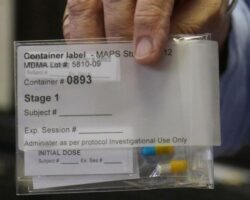MDMA Treatment Inches Nearer to Endorsement

MDMA-helped treatment is by all accounts viable in lessening side effects of post-horrendous pressure problem, as per a review distributed on Thursday.
The examination is the last preliminary led by Guides Public Advantage Organization, an organization that is creating remedy hallucinogenics. It intends to present the outcomes to the Food and Medication Organization as a component of an application for endorsement to showcase MDMA, the hallucinogenic medication, as a treatment for PTSD, when matched with talk treatment.
Whenever supported, “MDMA-helped treatment would be the principal novel treatment for PTSD in north of twenty years,” said Berra Yazar-Klosinski, the senior creator of the review, which was distributed in Nature Medication, and the boss logical official at the organization. ” PTSD patients can feel some expectation.”
PTSD influences around 5% of the grown-up populace of the US every year. In any case, traditional treatments and meds just assistance, best case scenario, around 50% of patients, said Dr. Stephen Xenakis, a specialist and the chief overseer of the American Hallucinogenic Professionals Affiliation, who was not engaged with the review.
“My clinical experience is that such a large number of people have lost trust with traditional medicines and treatments and feel the just ‘out’ for them is ending it all,” Dr. Xenakis said. ” We need to do more for them, and MDMA-assisted therapy is a new option that, if done with care and professionalism, could save their lives.
Since 1985, the Drug Enforcement Administration has classified MDMA, also known as Ecstasy or Molly, as a Schedule 1 drug, which places it in the highest category of controlled substances with a high potential for abuse and no medical use.
Before that, MDMA was regulated by an expected many specialists in North America and Europe for couples guiding, self-improvement and to address injury.
“The large misfortune to bring up is that it was clear in the last part of the 1970s and mid 1980s that MDMA had extraordinary remedial potential,” said Rick Doblin, pioneer behind the Multidisciplinary Relationship for Hallucinogenic Examinations (Guides), a philanthropic gathering that claims Guides PBC. ” All the enduring from that point forward, on the grounds that MDMA was condemned, is tremendous.”
Since 1986, MAPS has supported research into the efficacy of MDMA-assisted therapy for the treatment of post-traumatic stress disorder (PTSD). The Heffter Exploration Establishment, another charitable gathering, has been doing likewise for psilocybin, the dynamic fixing in sorcery mushrooms, beginning around 1993.
The F.D.A. in 2017 conceded “advancement treatment” status to MDMA-helped treatment as a treatment for PTSD. The assignment permits the improvement of promising trial medications to be optimized. Psilocybin-helped treatment for treatment-safe misery was conceded advancement status in 2018.
The 104 members in the new review had been determined to have moderate to extreme PTSD and had lived with the condition for a normal of 16 years. They included casualties of life as a youngster injury, battle veterans, overcomers of rape and others. Many had a background marked by self-destructive contemplations and furthermore experienced comorbidities, for example, sorrow and liquor use jumble.
Every member worked with a two-man treatment group and got three hour and a half preliminary, talk treatment meetings followed by three treatment cycles, dispersed one month separated. Each comprised of an eight-hour exploratory meeting where the member took either MDMA or a fake treatment matched with talk treatment, and afterward went to three hour and a half talk treatment meetings.
53 participants received MDMA and 51 received an inactive placebo during the experimental sessions. Neither the advisors nor the members were educated which patients had gotten the MDMA.
The members in the gathering that were given MDMA experienced fundamentally more prominent decreases in their PTSD side effects contrasted and those in the gathering that were given a fake treatment, as per the examination article.
Toward the finish of the review, 86.5 percent of individuals in the MDMA bunch accomplished a quantifiable decrease in seriousness of side effects, specialists revealed. Around 71% in the MDMA bunch further developed an adequate number of that they at this point not met the measures for a PTSD conclusion. Of the people who took the fake treatment, 69% improved and almost 48% as of now not qualified for a PTSD determination.
The discoveries were like the aftereffects of the main Stage 3 investigation of MDMA-helped treatment for PTSD, distributed in Nature Medication in 2021. For the 90 members in that review, 67% in the gathering given MDMA presently not qualified for a PTSD finding two months after treatment, contrasted and 32 percent in the fake treatment bunch.
One eminent distinction in the latest review was the variety of members, said Jennifer Mitchell, a neuroscientist at the College of California San Francisco and the lead creator of the two examinations.
In excess of a fourth of the members in the new review were Hispanic or Latino and around 34% were nonwhite, though around 9% of members in the 2021 review were Hispanic or Latino and 22 percent were nonwhite.
“We worked long and difficult to get a review populace that is more in accordance with everyone with PTSD,” Dr. Mitchell said. ” This isn’t simply advantaged individuals with loads of time and assets.”
The expansion in member variety concurred with an expansion in the quantity of specialists of variety, to 28 percent in the new review, up from 11% in 2021. MAPS PBC said it likewise offered members transportation to and from concentrate on locales as well as allowances to compensate for lost compensation or to cover youngster or senior consideration.
Albert Garcia-Romeu, a psychopharmacologist at the Johns Hopkins University School of Medicine who was not involved in the research, stated that the diversity of the participants is “certainly an improvement over prior studies.” However, he went on to say that “considering the substantial health disparities these groups face, it will be critical to see more Black and Indigenous people enrolled.”
As in past investigations of MDMA-helped treatment, the treatment was by and large all around endured, as per the information introduced about antagonistic occasions. Normal secondary effects, basically for those in the MDMA bunch, included muscle snugness, sickness, diminished craving and perspiring.
During the course of the study, one participant in the placebo group and two in the MDMA group both had serious suicidal thoughts but did not attempt suicide.
“Individuals in the two gatherings had specific antagonistic occasions that would concern, similar to suicidality, at tantamount rates, however outstanding the vast majority in the review were at that point battling with those difficulties in advance,” Dr. Garcia-Romeu said.
In total, seven participants had cardiovascular problems, including faster heartbeats. Even though these events “were generally not severe,” Dr. Paul Summergrad, a professor of psychiatry at Tufts University School of Medicine who was not involved in the research, said that they might suggest that a cardiologist should evaluate older patients or those with known heart problems before using MDMA.
MAPS PBC stated that it had collaborated closely with the FDA to select the study methods and the required number of participants to evaluate the new treatment’s safety and effectiveness.
Most members accurately speculated whether they had gotten a fake treatment or MDMA. This is an ordinary test across psychiatry research and is something “the creators recognize and did all that could be within reach to moderate,” said Dr. Steven Zalcman, head of the grown-up pathophysiology and natural mediations advancement branch at the Public Foundation of Psychological wellness, who was not associated with the examination.
The researchers are currently working on a follow-up study to investigate the effects of MDMA-assisted therapy over time. Discoveries from Stage 2 examinations supported by Guides demonstrated that the advantages endured no less than a year for most members who got the medication.
MAPS PBC plans to present another medication application to the F.D.A. looking for endorsement for MDMA-helped treatment. The organization, which doesn’t remark on forthcoming medication surveys, could arrive at a choice soon.
The findings of the study, according to some outside experts, would not meet the F.D.A.’s approval requirements.
“The advantages in the dynamic gathering were truly not a lot more prominent than the advantages in the fake treatment bunch,” said Dr. Allen Frances, a teacher emeritus of psychiatry at Duke College. ” Treatment with MDMA would result in a massive misallocation of resources that were already extremely limited, despite only providing a small benefit to the system.
Dr. Akua Prieto Brown, the clinical overseer of Speculative chemistry Local area Treatment Center in Oakland, Calif., who likewise was not engaged with the review, scrutinized this “shortage mentality,” nonetheless, and said that the concentration for medical care experts ought to rather be “on expanding therapy choices for a condition that is famously hard to treat.”
Conflicts among emotional well-being experts are normal, Dr. Xenakis said, adding that “structural movements of this aspect are problematic and can deliver a greater number of cracks among the experts than understanding.”
Government endorsement for MDMA-helped treatment would likewise mean the medication would need to get a less serious positioning for controlled substances by the D.E.A. what’s more, from states.
Advisor preparing is another expected bottleneck. The organization as of now administers its own advisor schooling program and is working with different accomplices, including colleges, to increment preparing.
The particular principles and necessities that the F.D.A. could look for from prescribers, and what the organization would frame for the marking directions of MDMA-helped treatment, are as yet open inquiries, said Amy Emerson, the CEO of Guides PBC.
“Drug-helped treatment hasn’t been supported previously, so there’s not much of point of reference,” she said.
The organization has not yet set a cost for the medication, Ms. Emerson said, and it won’t oversee how much the treatment part will cost.
In any case, it is reaching insurance agency, Medicaid and Government medical care to attempt to get inclusion, Ms. Emerson said. The gathering is likewise chipping away at patient access projects to assist the individuals who with doing not have inclusion and who can’t pay personal to get limits or even free treatment.
Dr. Doblin stated, “it feels a bit too early to really celebrate” given the obstacles that remain. Yet, it’s been a long, long interaction, and it’s astonishing that we are this far.”


